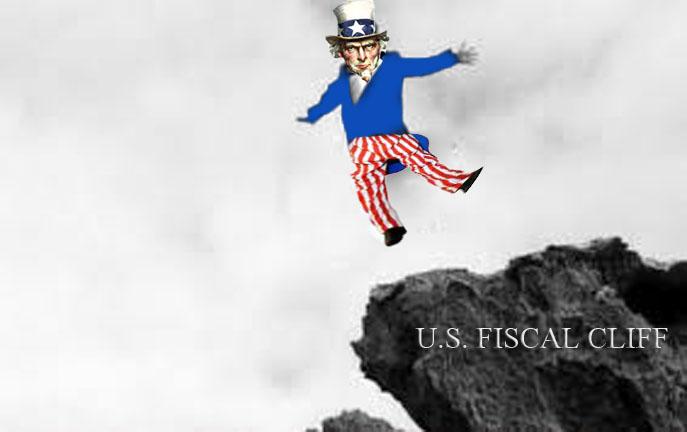|
|
|
||||
|
|
|||||
What is Fiscal Cliff - Will US Economy See Fall from Cliff
|
Ads by Google by
Knowledge Level 1 :
What is meaning of "Fiscal" and What is meaning of "Cliff"
"Fiscal Cliff" has been in news for quite some time now. The term in the last part of 2012 is being discussed in the context of USA and thus most of Indians do not understand this. Moreover, even the exact meaning of the word "cliff" is not known to Indians as we have few hills around us. So let us start with some fundamentals.
I think most of bankers understand the word "Fiscal". This means involving financial matters. We frequently use this like "Fiscal Year" and Fiscal Deficit". Thus, we will not waste further time on this word. Coming to second word "Cliff", which is more known to people who live in hills, it means "a steep, or overhanging face of the rock, especially at the edge of sea".
Ads by Google
This is a Cliff
What is Fiscal Cliff : Towards the end of 2012 in USA, the Fiscal Cliff terms is hotly discussed. Fiscal Cliff here refers to the economic effects that could result from (a) tax increases, (b) spending cuts and (c) a corresponding reduction in the US Budget deficit beginning in 2013, if the existing laws are not changed by the end of 2012.
Ads by Google Interestingly, there are number of scheduled measures in the US economy which are to take effect from beginning of January 2013. If these measures are allowed to take place, the deficit in US budget (we know deficit is the difference between what the government takes and what is spends) is likely to be reduced by almost half beginning the first days of 2013. This kind of sudden fall in deficit in a short period of time is known as "fiscal cliff".
Knowledge Level 2 :
What are the Components That Are Likely to Precipitate Fiscal Cliff :
We give below some of the major components relating to revenue and spending measures that are set to expire or take effect from beginning of January 2013, and can have cascading effect on the US Economy : -.
(A) Revenue Increases
(B) Spending Cuts :
Knowledge Level 3 :
Ads by Google 
Impact of Fiscal Cliff i.e. If no action is taken and legislations are allowed to expire :
What is worrrying the US analysts and economists is that
federal government allowed the above two events to proceed (revenue increase and
spending cuts) as planned, they could have a detrimental effect on an already
shaky US economy. The results can lead even sending the economy back into
an official recession as it cut household incomes, increased unemployment rates
and undermined consumer and investor confidence. At the same time, it was
predicted that going over the fiscal cliff would significantly reduce the
federal budget deficit.
Certainly there are few who feel Fiscal Cliff would
have a long-term positive impact. These people argue that the U.S.
has to certainly tackle its deficits at some point of time. It is
better to bite the bullet at this stage and this initiative can prove a step the
right direction. Although the short-term impact could be severe (recession
in 2013), the bullish argument would hold that the long-term gains (lower
deficits, lower debt, better growth prospects, etc.,) would be worth the
short-term pains.
|
|
|
